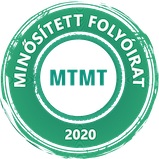Migráns gyermekek névhasználata
Egyénnév-választás nyelvi-kulturális kontaktushelyzetben
Absztrakt
Naming children from immigrant families. Choice of given names in a situation of language and cultural contact
Based on research done in 2012, this paper presents how immigrant children educated in present-day Hungarian public schools are named, paying special attention to name assimilation and acculturation. Describing the characteristic features of given names and changes in name order is important, because it may offer a basis for a better understanding of Hungarian historical onomastic sources concerning the name use of immigrant groups. This research proves that the Hungarian name order (family name + given name) is extremely influential today and shows no sign of ethnic dependence in administrative or school communication. Inclination toward assimilation displayed in the choice of the given name, in most cases, appears in informal names, and affects official names only to a lesser degree. Functionally, the informal names are names for the child, usually chosen by a parent or the child him- or herself. Mostly, these names are acknowledged Hungarian given names, coinciding with those used in contemporary Hungarian communities; a small proportion of the names under discussion, however, are morphologically modified forms, in which the function of the present-day Hungarian diminutive suffix is presumably misinterpreted by the name bearers.




